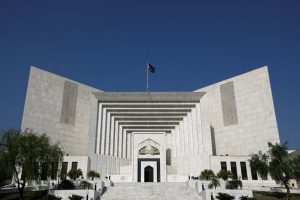The Supreme Court’s ruling that the 1999 National Accountability Ordinance (NAO) amendments are null and void was challenged in a review petition filed in ISLAMABAD on Friday.

Through his lawyer, Farooq H Naek, petitioner Abdul Jabbar has asked the court to reconsider its decision dating back to September 15, 2023.
Despite not being a party to Imran Khan, chairman of the Pakistan Tehreek-e-Insaf,’s constitutional case contesting the NAB law modifications, the petitioner claimed to be offended by the court’s judgement.
The petitioner focused on the fact that the top court had lowered the minimum monetary barrier of NAB from Rs. 500 million, as established by parliament, to Rs. 100 million.
Questions about whether the court’s verdict followed natural justice principles and whether a breach of fundamental rights necessitating enforcement before the exercise of the court’s original jurisdiction under Article 184(3) of the Constitution are just two of the many legal and factual grounds for reconsideration raised in the review petition.
It further inquired as to whether the court had regarded the fundamental principles of parliamentary democracy in not declaring a portion of the legislation (the modifications to the NAB Ordinance) as supra vires.
The petitioner further claims that Articles 4, 9, 10A, 14, and 25 of the Constitution have been violated by the contested decree. The petitioner further questioned whether or not the court’s decision declared the provisions of the amending Acts of the Parliament to be ultra vires on the policy consideration and opposed to the “will of the people,” as expressed through the subject amendments.
Since “it was the parliament which enacted the National Accountability Ordinance, 1999 and it’s the parliament alone to decide how, when, and if to amend and/or alter the same,” it asked the court to look into whether the judgement has limited parliament’s jurisdiction to pass laws.
The review petition asked, “Whether the impugned judgement not failed to appreciate that the amendments carried out in the National Accountability Ordinance, 1999 by the Parliament did not take away any offence from the grip of law, but have streamlined the same through channelling to the relevant authorities?”
The petition also questioned if the Supreme Court had “not assumed the position of being a ‘legislator’ and ‘policy maker'” with the ruling, which would be outside the Court’s purview under Article 184(3) of the Constitution.
It also questioned if the Supreme Court has the authority to alter the monetary jurisdiction of the National Accountability Bureau (NAB), which has been fixed by legislation at Rs500 million.
It claimed the highest court made a mistake by not recognising that no fundamental rights of Pakistani citizens had been violated, no change had been made to the constitution’s basic structure, no threat had been made to the independence of the judiciary, and no change had been made to the constitution’s Islamic character.
It also raised concerns about whether the decision was inconsistent and based on a misreading of the legislation and two amendments in which selective sections had been thrown down.
The Facts of the Case
On September 15, the Supreme Court issued a much-anticipated ruling, allowing a petition from former prime minister Imran challenging changes to the National Accountability Ordinance (NAO) 1999 made by the coalition government of the Pakistan Democratic Movement (PDM), led by the Pakistan Muslim League-Nawaz (PML-N), and restoring corruption cases against public office holders that had been dropped after the changes were made.
By a vote of 2 to 1, the Supreme Court ordered the reopening of all closed corruption proceedings against political figures from various parties and public office holders involving amounts of corruption less than Rs500 million. The court invalidated the changes.
On top of that, the highest court ordered all case records to be returned to the appropriate courts within seven days from the National Accountability Bureau (NAB).
The ruling also made clear that the challenged NAB reforms had an effect on fundamental constitutional freedoms.
An order was made public by outgoing Pakistani chief judge Umar Ata Bandial in his final session, reading: “By a majority of 2:1 (judge Syed Mansoor Ali Shah dissenting), Constitution Petition No.21 of 2022 is approved.
Judgements handed down by accountability courts in accordance with the new legislation have also been overturned by the court.









































